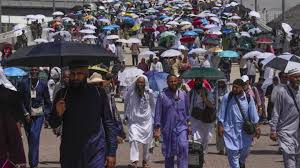New Delhi:At this time, most of the areas of India are experiencing extreme heat. On top of that, the hot waves of heat have made life even more difficult for people. This season’s heat in India has broken the record of 60 years somewhere and 100 years somewhere else. Forget about the day, now the situation is such that there is no relief from the heat even at night. Now even the minimum temperature is increasing continuously. But it is not only India that is experiencing so much heat. There are many countries in the world where the heat is worse than India. Now think about the heat in which the condition of the people of India has worsened. On the other hand, in the countries where the heat is more than India, what condition the people must be living in.

On one hand, more than 1000 Haj pilgrims have died due to extreme heat in Saudi. On the other hand, heat has created havoc in Mexico too. More than 125 people have died in Mexico. Many parts of the world are currently recording above-average temperatures, weather experts say that this is the result of global warming. The kind of extreme heat that is being experienced in many parts of the world is proving to be fatal for some people. In 2003, 30,000 people died in the European heatwave. Such high temperatures for a long time also increase the risk of forest fires. According to a BBC report, temperatures are rising in many parts of the world, including North America, South and East Asia, and South-Eastern Europe.
Severe heat in Saudi Arabia
Saudi Arabia is experiencing severe heat this time and the worst hit are the thousands of Haj pilgrims who have reached here. So far, about 1000 Haj pilgrims have died in Mecca amid the severe heat. The temperature in the holy city of Mecca has reached 51.8 degrees Celsius. According to the report of news agency AFP, amid the heat, an Arab diplomat said that at least 600 people have died in Egypt alone. A day earlier this number was around 300. But looking at the data released by different countries, AFP said that more than 900 people have died so far. According to a Saudi research published last month, the temperature in the area where rituals are performed is increasing by 0.4 degrees Celsius (0.72 degrees Fahrenheit) every decade.
Severe heat in Mexico has become a death knell
This time the severe heat in Mexico has become a death knell for humans and monkeys. In the recent days, there was news of at least 138 monkeys dying due to heat in Mexico. Now there is news of 125 people dying in Mexico. The heat in Mexico has become a cause of trouble for both humans and animals. These days the temperature during the day is crossing 45 degrees Celsius. In such extreme heat, the local people are struggling on a large scale to save the monkeys.
The wrath of heat in Greece
Apart from Saudi Arabia and Mexico, the heat in Greece has also made the lives of people miserable. Here too, many deaths have occurred due to the heat wave. Tourists who came here to enjoy the beauty of Greece could not escape the heat wave. Many tourists have died here since the onset of extreme heat. Greek authorities have decided to close the Acropolis in Athens in recent days, while schools have been closed as a precaution. Firefighters are also engaged in extinguishing the forest fire on the island of Lesvos.
It is not unusual for Greece to have excessive heat, but this time the situation here is different. Meteorologists say that the temperature of Greece is increasing due to the winds coming from North Africa. The situation of the cities here may worsen in the coming days. Due to the temperature reaching a record 45 degrees Celsius, even schools and tourist places have had to be closed. Locals and tourists have been warned to be prepared to deal with the rising temperatures.
Sun scorched people badly in America
This time America is also experiencing severe heat. According to information, America had experienced severe heat in 1936 before this. Then the temperature in Illinois, America had reached 37.7 degrees and in North Dakota it had reached 48.8 degrees Celsius, which led to the death of about 5,000 people. In Phoenix, the temperature has crossed 44 degrees Celsius. New heat records are being made in many cities including Chicago. Chicago broke the record of 1957 with a temperature of 36.1 degrees Celsius. The hot and humid weather in Chicago is expected to continue for some more time. The level of heat index is also going up in America, which has further increased the troubles of the people.




